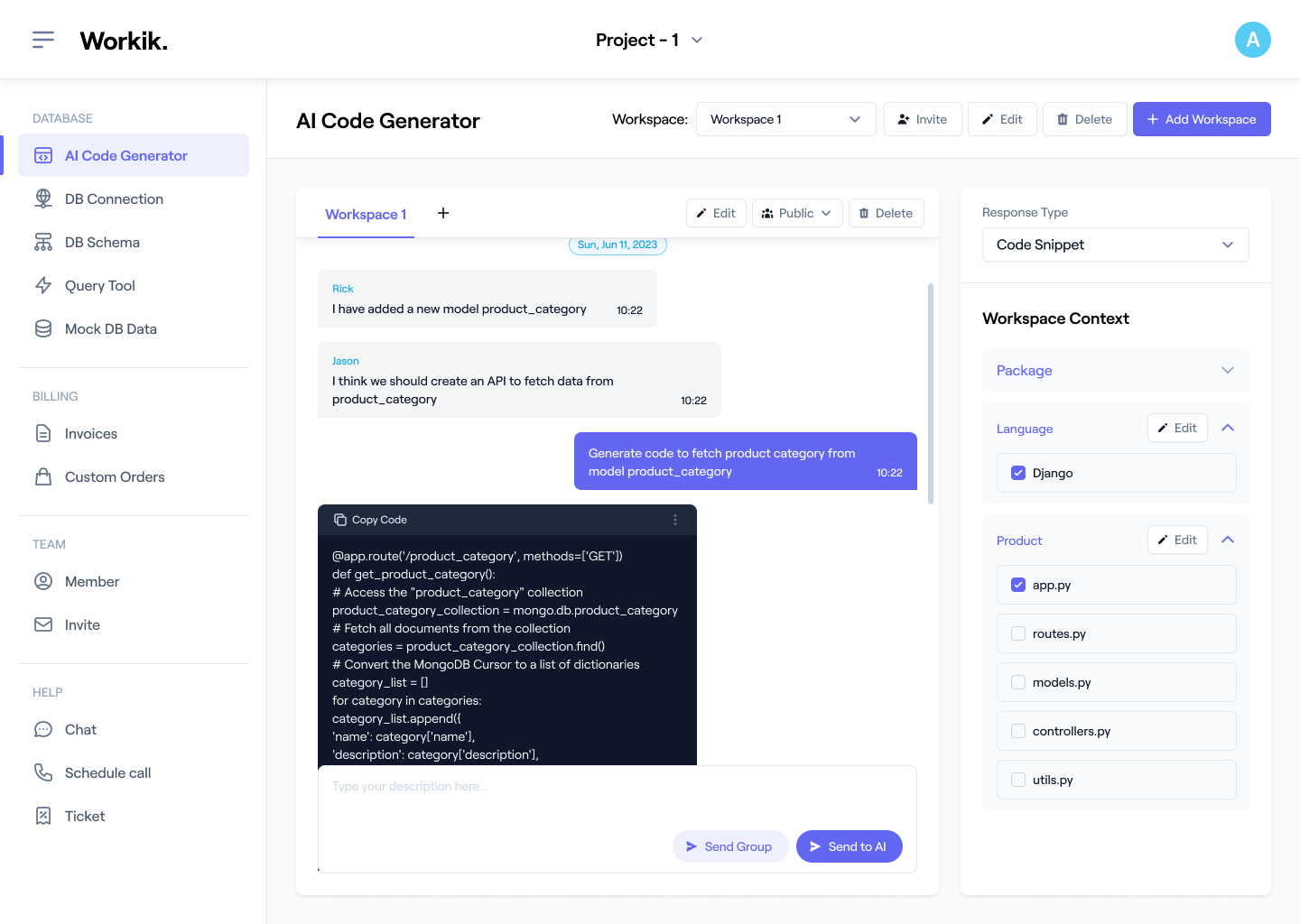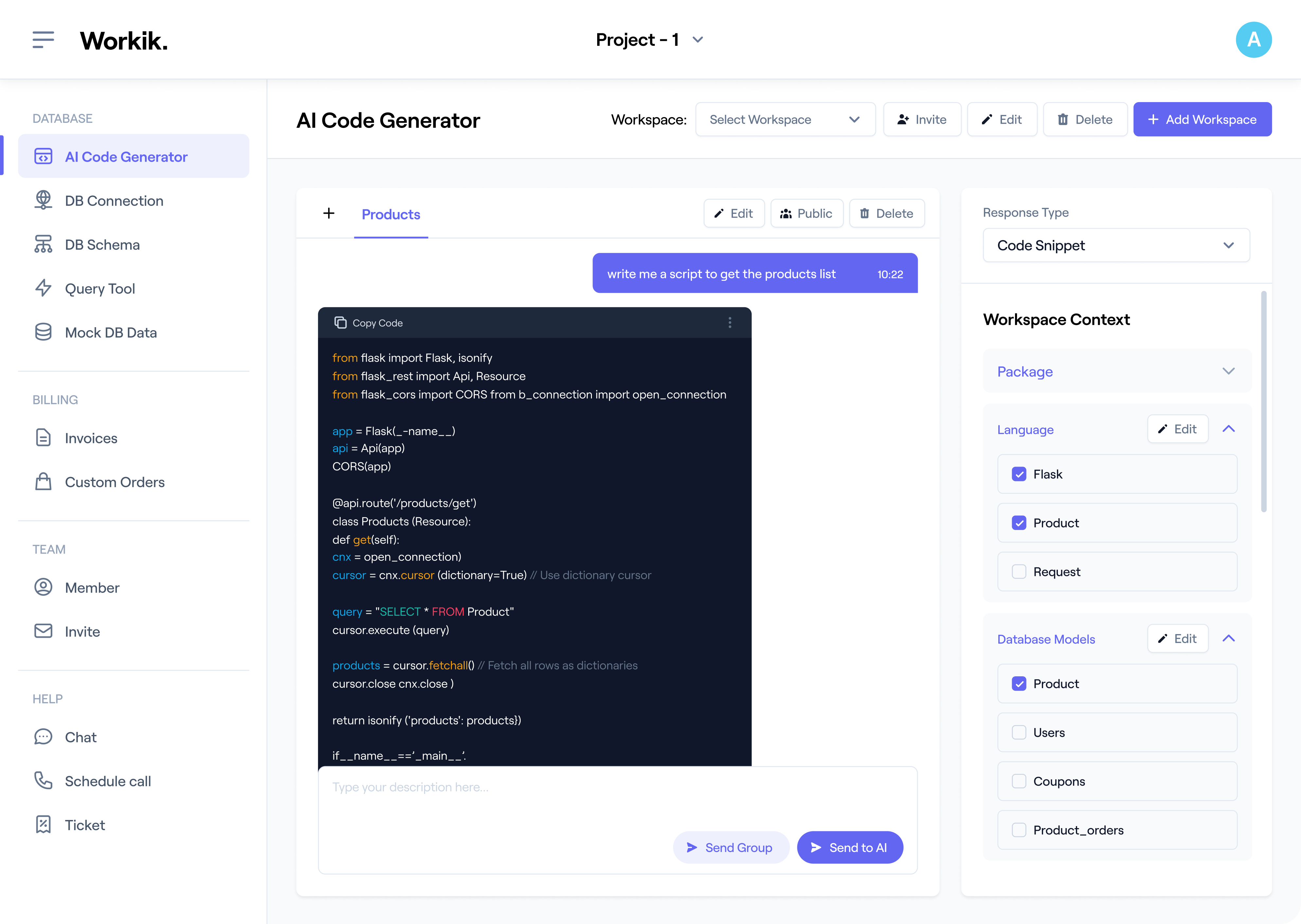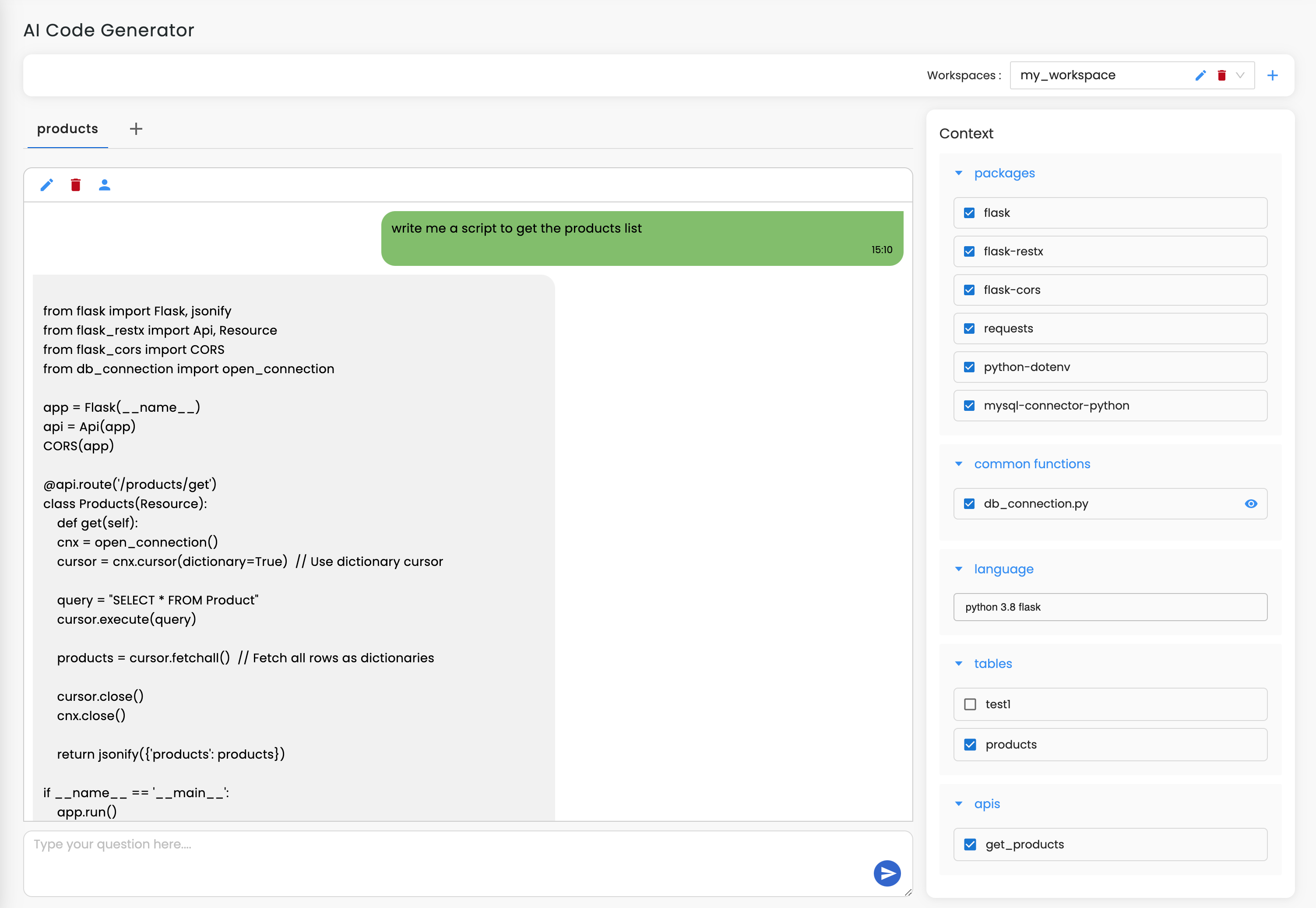
Join our community to see how developers are using Workik AI everyday.
Features

Automate CORS Rules
AI generates Access-Control-Allow-Origin and Access-Control-Allow-Methods headers for frameworks like Express.js, Flask, and more.

Simplify Preflight Handling
Streamline preflight requests with AI and integrate seamlessly with Postman and Swagger for faster API configurations.

Optimize API Security
AI creates secure, domain-specific CORS policies to protect data and prevent over-permissioning.

Enhance Request Validation
AI validates cross-origin requests and delivers actionable insights for refining setups in React, Angular, and more.
How it works
Create your account with Google or manually register to access Workik’s AI-powered CORS Policy Generator.
Connect with GitHub, GitLab, or Bitbucket to link your codebase. Specify frameworks like Express.js, Flask, or Spring Boot, and provide API details to tailor CORS configurations for your project.
Use AI to generate precise Access-Control-Allow-Origin headers, configure preflight handling, and fine-tune policies for secure cross-origin requests. Integrate easily with tools like Postman and Swagger for validation.
Invite your team in shared workspaces to review configurations. Test your CORS policies in production environments like Nginx or Apache.


Expand
.png)
.png)
Expand


Expand


Expand


Expand


Expand


Expand


TESTIMONIALS
Real Stories, Real Results with Workik
Workik’s AI resolved CORS errors by automating precise header configurations for my Flask APIs.

Rajveer Shah
Back-End Engineer
Debugging preflight issues across services became effortless with Workik’s AI-powered CORS tools.

Alita Rivera
DevOps Specialist
Workik’s CORS Policy Generator optimized API integrations for React apps in minutes.

Jackson Morgan
Full-Stack Developer
What are some popular use cases of Workik's AI-powered CORS Policy Generator?


Workik’s AI-powered CORS Policy Generator caters to various use cases which include but are not limited to:
* Automating Access-Control-Allow-Origin and preflight configurations.
* Debugging CORS errors for React, Angular, and Vue.js apps.
* Managing cross-origin policies for APIs in microservices and multi-domain setups.
* Securing APIs with dynamic, domain-specific CORS rules.
* Validating CORS policies on Nginx, Apache, or cloud-hosted APIs.
* Simplifying configurations for serverless and distributed systems.
What context-setting options are available in Workik’s AI for CORS Policy Generator?


Workik provides robust context-setting options for tailoring CORS policies, allowing users to:
* Integration with GitHub, GitLab, or Bitbucket for API repository access.
* Framework-specific setups for Node.js, Flask, Django, Express.js, and Spring Boot.
* Flexible Access-Control-Allow-Origin rules, including wildcards and specific origins.
* Fine-tuned preflight settings with OPTIONS requests and Access-Control-Max-Age.
* Dynamic Access-Control-Allow-Credentials for secure authenticated APIs.
* JSON-based policy templates for quick and reusable configurations.
* Real-time validation using Postman, Swagger, or browser developer tools.
* Support for CDN platforms like Cloudflare and AWS for global API policies.
* Multi-origin configurations for subdomains and multi-region APIs.
How does Workik handle APIs requiring regional or dynamic origins?


Workik customizes policies for globally distributed APIs, creating dynamic rules for region-specific access. For example, a CDN-hosted API on Cloudflare can allow European domains while blocking others based on usage patterns.
What role does Workik play in securing authentication-based APIs?


Workik configures precise Access-Control-Allow-Credentials rules for secure token or cookie-based authentication. For instance, it ensures OAuth2-secured APIs pass credentials safely without exposing them to untrusted origins.
Can Workik help optimize CORS policies for serverless backends?


Yes, Workik tailors lightweight CORS policies for platforms like AWS Lambda or Azure Functions, reducing preflight latency. For example, it adjusts Access-Control-Max-Age and headers to ensure efficient performance under heavy traffic.
Does Workik support hybrid setups with public and private APIs?


Workik manages mixed setups by creating restrictive policies for private APIs while enabling flexible rules for public ones. For instance, internal tools access private APIs securely, while public-facing APIs maintain broad accessibility.
How does Workik help scale CORS policies for multi-tenant applications?


Workik dynamically generates tenant-specific rules for multi-tenant environments. For example, domains like tenant1.example.com and tenant2.example.com each receive unique, secure configurations.
How can Workik AI integrate CORS policy updates into CI/CD pipelines?


Workik AI automates CORS updates in Jenkins or GitHub Actions by generating and validating headers like Access-Control-Allow-Origin during deployment. It ensures environment-specific policies, validates with tools like Postman, and tracks changes via Git for seamless version control.
Generate Code For Free

CORS: Question and Answer
CORS, or Cross-Origin Resource Sharing, is a web security mechanism that controls how resources from one origin (domain) are requested by another. It uses HTTP headers like Access-Control-Allow-Origin and Access-Control-Allow-Methods to grant or restrict cross-origin access. CORS is crucial for APIs, ensuring secure and controlled communication between web clients and servers.
Key technologies for managing CORS include:
Languages:
JavaScript, Python, Java, C#
Frameworks:
Express.js, Flask, Django, Spring Boot, ASP.NET Core
Libraries:
cors (Node.js), flask-cors, django-cors-headers
Servers:
Nginx, Apache, IIS
Tools:
Postman, Swagger, Browser DevTools
Cloud Platforms:
AWS API Gateway, Azure Functions, Cloudflare
CORS is widely applied in scenarios which include but are not limited to:
API Integration:
Enable secure API requests from web apps like React or Angular.
Third-party Services:
Manage CORS for payments, maps, or authentication APIs.
Microservices:
Ensure secure cross-origin communication between distributed services.
CDNs:
Configure CORS for shared resources like fonts and images.
Serverless Backends:
Set up CORS for APIs on AWS Lambda or Azure Functions.
Authentication:
Secure credential transfer with Access-Control-Allow-Credentials.
Career opportunities for professionals working with CORS include roles such as Front-End Developer, Back-End Developer, DevOps Engineer, Cloud Architect, and API Security Specialist.
Workik AI simplifies and automates CORS tasks, such as:
Automate Policies:
Instantly generate Access-Control-Allow-Origin and preflight headers.
Debug Errors:
Identify and fix misconfigurations with AI-powered diagnostics.
Dynamic Rules:
Create flexible policies for multi-domain and subdomain APIs.
Preflight Optimization:
Cache OPTIONS responses to minimize latency.
Validation:
Test and refine configurations with Postman, Swagger, and DevTools.
Refactor Configurations:
Streamline and optimize existing CORS setups.
Server Support:
Customize headers for Nginx, Apache, and cloud platforms.
Monitoring:
Log and analyze cross-origin requests to enhance security.
Documentation:
Auto-generate detailed CORS policies for teams and audits.
Explore more on Workik
Code Generators
Get in touch
Don't miss any updates of our product.
© Workik Inc. 2026 All rights reserved.

